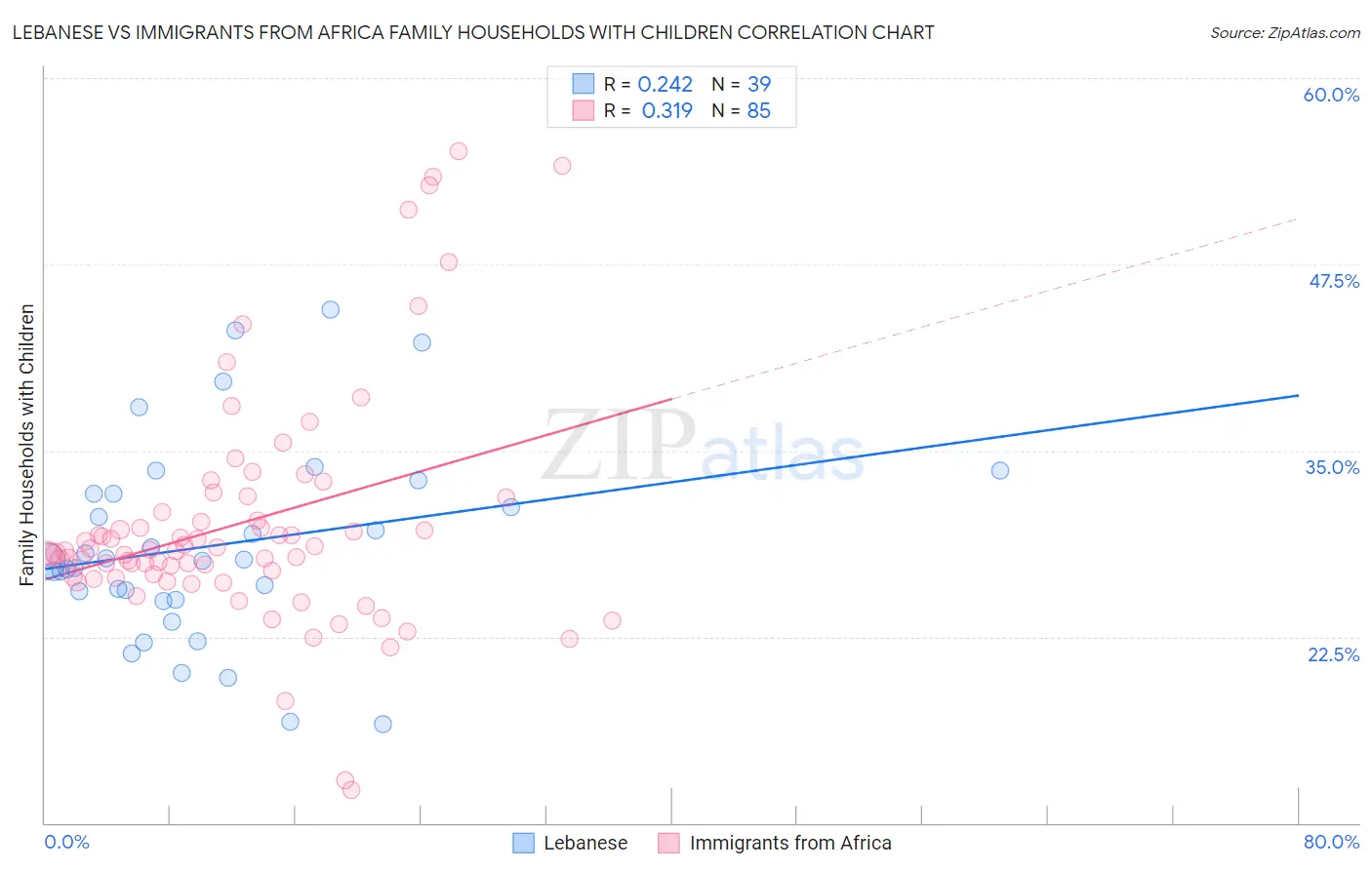Lebanese vs Immigrants from Africa Family Households with Children
COMPARE
Lebanese
Immigrants from Africa
Family Households with Children
Family Households with Children Comparison
Lebanese
Immigrants from Africa
27.7%
FAMILY HOUSEHOLDS WITH CHILDREN
87.4/ 100
METRIC RATING
131st/ 347
METRIC RANK
28.0%
FAMILY HOUSEHOLDS WITH CHILDREN
96.8/ 100
METRIC RATING
115th/ 347
METRIC RANK
Lebanese vs Immigrants from Africa Family Households with Children Correlation Chart
The statistical analysis conducted on geographies consisting of 401,138,996 people shows a weak positive correlation between the proportion of Lebanese and percentage of family households with children in the United States with a correlation coefficient (R) of 0.242 and weighted average of 27.7%. Similarly, the statistical analysis conducted on geographies consisting of 468,727,064 people shows a mild positive correlation between the proportion of Immigrants from Africa and percentage of family households with children in the United States with a correlation coefficient (R) of 0.319 and weighted average of 28.0%, a difference of 0.80%.

Family Households with Children Correlation Summary
| Measurement | Lebanese | Immigrants from Africa |
| Minimum | 16.7% | 12.2% |
| Maximum | 44.4% | 55.1% |
| Range | 27.8% | 42.9% |
| Mean | 28.6% | 30.1% |
| Median | 27.6% | 28.3% |
| Interquartile 25% (IQ1) | 25.0% | 26.5% |
| Interquartile 75% (IQ3) | 32.1% | 31.4% |
| Interquartile Range (IQR) | 7.1% | 4.9% |
| Standard Deviation (Sample) | 6.6% | 8.0% |
| Standard Deviation (Population) | 6.5% | 7.9% |
Demographics Similar to Lebanese and Immigrants from Africa by Family Households with Children
In terms of family households with children, the demographic groups most similar to Lebanese are Cajun (27.7%, a difference of 0.010%), Immigrants from Belize (27.7%, a difference of 0.080%), Immigrants from Eritrea (27.8%, a difference of 0.10%), Iranian (27.7%, a difference of 0.10%), and Syrian (27.8%, a difference of 0.12%). Similarly, the demographic groups most similar to Immigrants from Africa are South American Indian (28.0%, a difference of 0.010%), Arab (28.0%, a difference of 0.030%), Pakistani (27.9%, a difference of 0.13%), Immigrants from Malaysia (27.9%, a difference of 0.14%), and Central American Indian (27.9%, a difference of 0.14%).
| Demographics | Rating | Rank | Family Households with Children |
| Arabs | 97.0 /100 | #113 | Exceptional 28.0% |
| South American Indians | 96.9 /100 | #114 | Exceptional 28.0% |
| Immigrants | Africa | 96.8 /100 | #115 | Exceptional 28.0% |
| Pakistanis | 96.0 /100 | #116 | Exceptional 27.9% |
| Immigrants | Malaysia | 95.9 /100 | #117 | Exceptional 27.9% |
| Central American Indians | 95.9 /100 | #118 | Exceptional 27.9% |
| Zimbabweans | 95.6 /100 | #119 | Exceptional 27.9% |
| Europeans | 95.4 /100 | #120 | Exceptional 27.9% |
| Immigrants | Western Asia | 93.6 /100 | #121 | Exceptional 27.9% |
| Immigrants | Zimbabwe | 92.8 /100 | #122 | Exceptional 27.8% |
| Immigrants | Northern Africa | 91.8 /100 | #123 | Exceptional 27.8% |
| Immigrants | Singapore | 90.8 /100 | #124 | Exceptional 27.8% |
| Ecuadorians | 90.8 /100 | #125 | Exceptional 27.8% |
| Immigrants | Ethiopia | 90.5 /100 | #126 | Exceptional 27.8% |
| Belizeans | 90.0 /100 | #127 | Exceptional 27.8% |
| Syrians | 89.7 /100 | #128 | Excellent 27.8% |
| Immigrants | Eritrea | 89.4 /100 | #129 | Excellent 27.8% |
| Cajuns | 87.6 /100 | #130 | Excellent 27.7% |
| Lebanese | 87.4 /100 | #131 | Excellent 27.7% |
| Immigrants | Belize | 85.7 /100 | #132 | Excellent 27.7% |
| Iranians | 85.2 /100 | #133 | Excellent 27.7% |